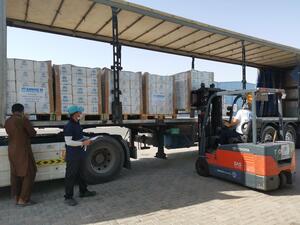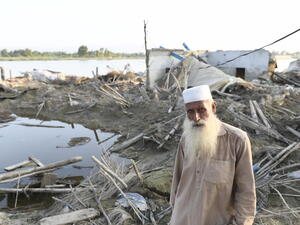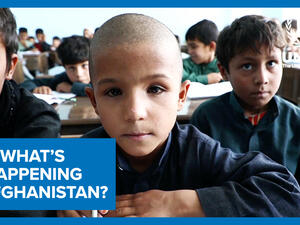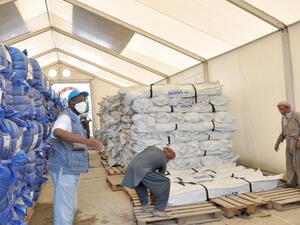More than 300,000 Afghan refugees return with aid
More than 300,000 Afghan refugees return with aid
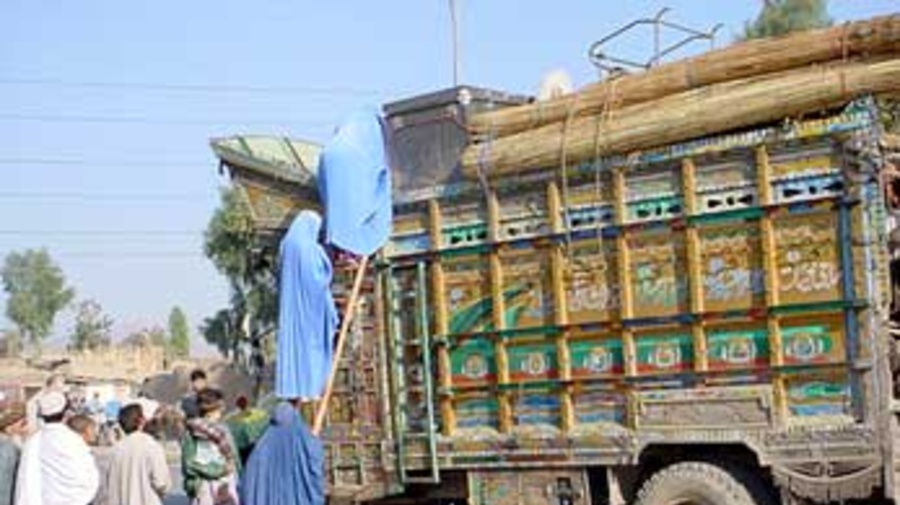
Afghan refugees returning from Pakistan's Katcha Garhi camp, which has since been closed.
GENEVA, July 29 (UNHCR) - More than 300,000 Afghan refugees have returned home this year with support from the UN refugee agency, a spokesman said Tuesday. Including spontaneous returns from Iran, the number of Afghans back in their homeland so far this year now stands at more than 355,000.
At the same time, UNHCR has been distributing emergency aid to thousands of Afghan families who lost their homes and crops when dust storms swept western Afghanistan.
Last week, more than 14,000 Afghan refugees returned home from abroad with UNHCR help. That number is down from a nearly two-month period when the agency witnessed 20,000 refugees repatriating weekly.
The number of returning refugees is greatly reduced from the number of returns witnessed over 2002, when more than 1.8 million Afghan refugees went back with UNHCR help, but a spokesman described the pace of returns as still "significant." At the height of returns to Afghanistan in May 2002, more than 20,000 people were repatriating daily.
"Despite ongoing security problems in parts of the country and tremendous development and economic needs, Afghan refugees are still going back in significant numbers," said UNHCR spokesman Kris Janowski at a news briefing in Geneva Tuesday.
UNHCR has assisted more than 304,000 Afghan refugees to return home this year from Pakistan and Iran. More than 50,000 other refugees have spontaneously repatriated from Iran over the same period.
The refugee agency is also helping Afghans to return from further afield. So far this year, more than 370 refugees have gone back from 14 other countries, including Cambodia, Brazil, Ukraine and Malaysia. Afghans also regularly troop home from the five adjacent Central Asian states: Uzbekistan, Tajikistan, Turkmenistan, Kyrgyzstan and Kazakhstan.
Each returning family receives a UNHCR aid package and food from the UN World Food Programme. This year, the refugee agency plans to provide 60,000 housing repair kits to Afghans going home with its assistance. Already, more than 12,700 families have begun work using their UNHCR shelter construction kits.
Iran and Pakistan have hosted millions of Afghan refugees since 1980. UNHCR believes there were 1.1 million Afghan refugees in Iran and 1.2 million Afghan refugees in Pakistan at the start of this year. Both countries also have large numbers of Afghan nationals who are not considered refugees.
Meanwhile, in the west of Afghanistan, the scale of damage caused by recent driving sandstorms that whipped through 50 remote villages is only now becoming known following a mission by relief agencies to Farah province.
Aid workers visiting the remote region following reports of the storm found that some 12,000 people had been displaced. Many families took refuge to the south, in Nimrouz province. Some even fled over the border into calmer areas in Iran to escape the storm, which buried houses, destroyed crops and filled water canals.
UNHCR is distributing wheelbarrows and shovels in the affected communities so that people can begin to dig out their buried homes and property. Other agencies are distributing food and other relief aid to the residents of the affected communities.





